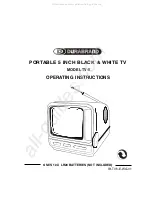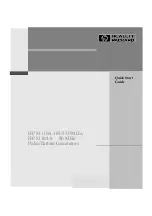
5
ENGINE SAFETY
Internal combustion engines present special hazards during operation and fueling! Failure to follow the
safety guidelines described below could result in severe injury or death. Read and follow all safety
warnings described in the engine operator's manual. A copy of this manual was supplied with unit when it
was shipped from the factory.
•
DO NOT
run engine indoors or in an area with poor ventilation unless exhaust hoses are used.
Engine exhaust contains carbon monoxide, a deadly, odorless and colorless gas which, if inhaled,
can cause nausea, fainting or death. Make sure engine exhaust cannot seep into closed rooms or
ventilation equipment.
•
DO NOT
fill fuel tank near an open flame, while smoking, or while engine is running.
DO NOT
fill tank
in an enclosed area with poor ventilation.
•
DO NOT
operate with the fuel tank cap loose or missing.
•
DO NOT
touch or lean against hot exhaust or engine parts.
•
DO NOT
clean air filter with gasoline or other types of low flash point solvents.
•
Keep hands, feet and loose clothing away from moving parts on the generator and engine.
•
If equipped, generator batteries contain sulfuric acid which can cause severe injury or death. Sulfuric
acid can cause eye damage, burn flesh or eat holes in clothing. Protective eye wear and clothing are
necessary when working on or around the battery. Always disconnect the NEGATIVE (-) battery
cable from the corresponding terminal before performing any service on the engine or other compo-
nents.
ELECTRICAL SAFETY
While the engine is running, potentially lethal voltages are present at the outlets located on the control
panel. Failure to follow the safety guidelines described below could result in severe injury or death.
•
Only a qualified and licensed electrician should make connections to the generator.
•
NEVER
wash the unit with any high pressure hoses or power washers.
•
NEVER
allow water to accumulate around the base of the unit. If water is present, DO NOT service!
•
NEVER
service electrical components if clothing or skin is wet. If the unit is stored outside, check the
engine and generator for any moisture and dry the unit before use.
•
NEVER
start the engine with any of the circuit breakers switched on or with any loads connected to
the control panel. Serious generator damage will result.
•
ALWAYS
disconnect the NEGATIVE (-) battery cable from the corresponding terminal before perform-
ing any service on the engine, generator or any other components. Remove the NEGATIVE (-) battery
cable from the corresponding terminal if the unit is to be stored or transported.






































